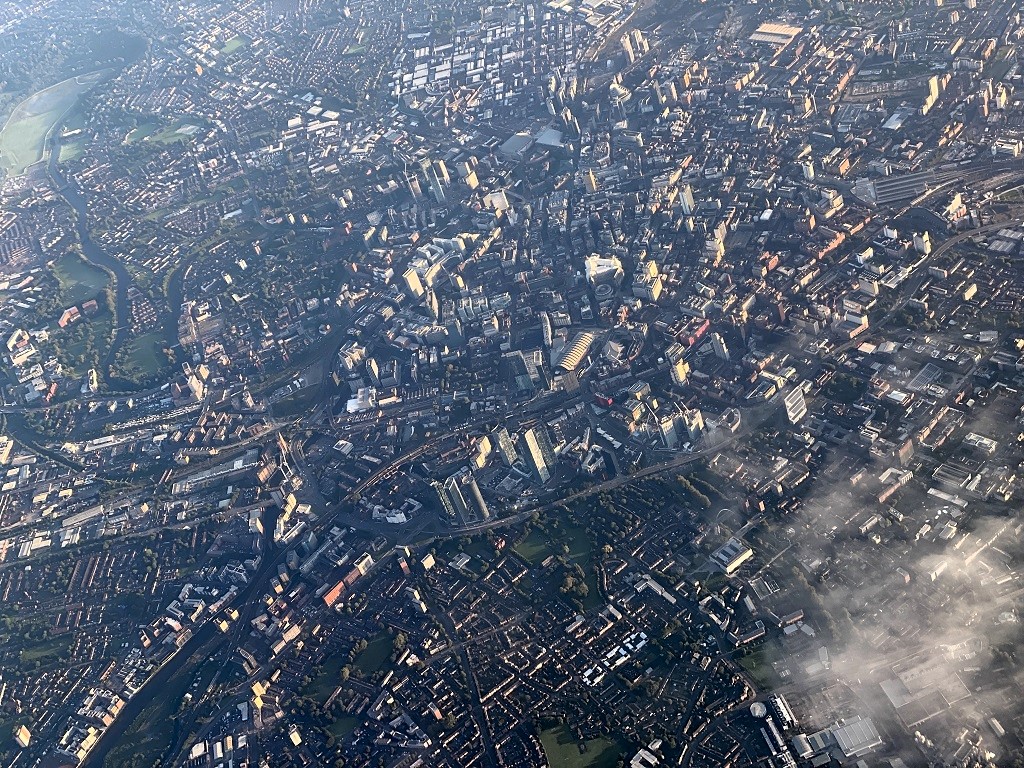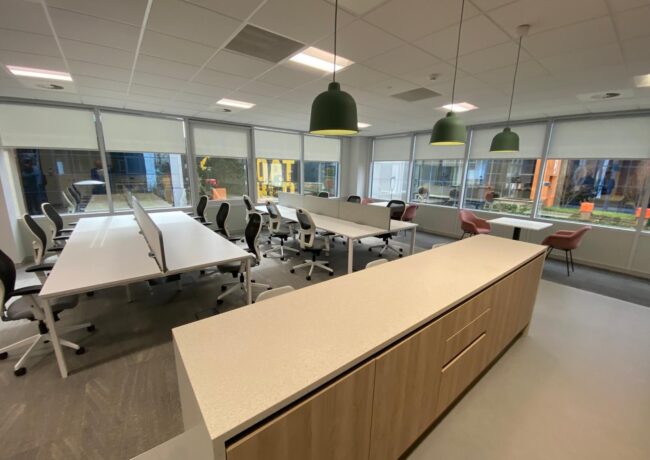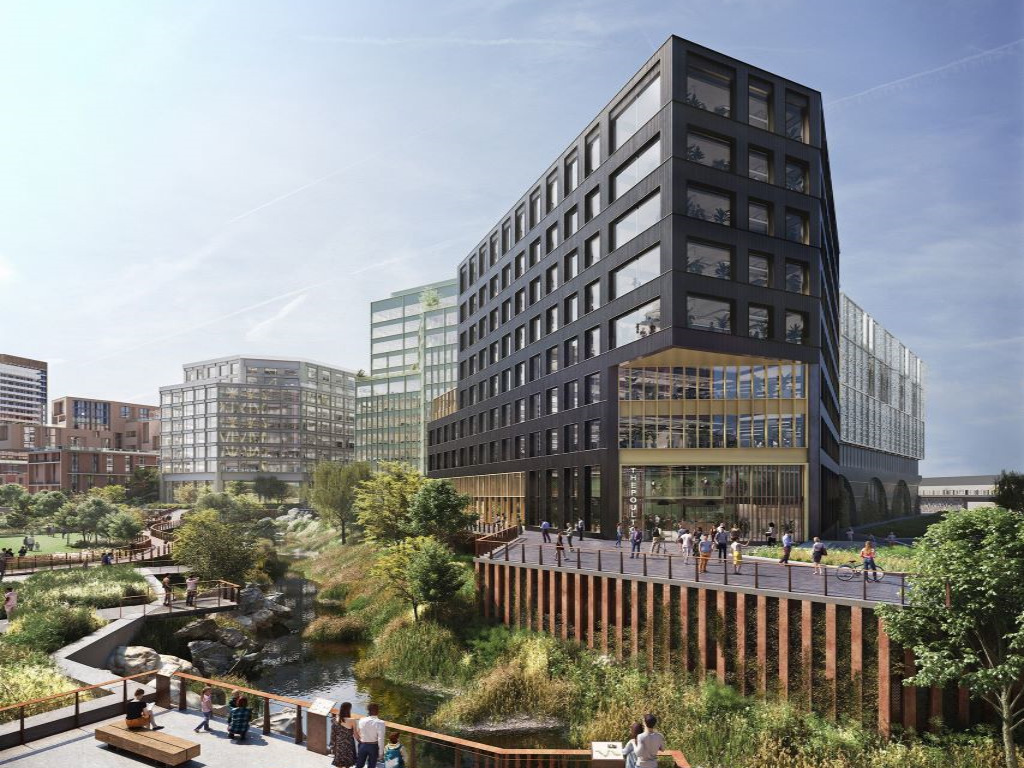Manchester launches 10-year economic strategy
Leader Cllr Bev Craig outlined the city’s next steps towards building upon its economic success over the past few decades.
“There’s at least another 10 to 15 years of delivering at the same scale that we have been doing,” Craig told a group of professionals across the built environment, financial, and other business sectors during the launch of “Investing in Success: An Economic Strategy for Manchester” at the Roku offices at No1 Circle Square on Tuesday.
Craig cited the private sector’s robust development pipeline in the city, which boasts a GDV of nearly £13bn. She also listed the more than 70,000 jobs that are projected to come to Manchester over the next decade and the 36,000 new homes to be built.
“Manchester has not lost its energy,” she told the crowd. “It’s not lost its buzz. It’s not lost its excitement. It’s not time to move somewhere else because we’re finished. There is so much more to be done.”
A reoccurring theme throughout the launch was the need for stable leadership, strong ambition, and clear vision. The economic strategy is meant to deliver that, setting up five key commitments for the city council in the future:
- Use investment and development to drive inclusive growth
- Nurture thriving, productive, and innovative sectors
- Develop world class infrastructure, places, and talent
- Transition to a zero-carbon and resilient economy
- Include more people in economic opportunity
To deliver on these goals, the city council said it would create and maintain a development prospectus for new and existing investors.
Also on the to-do list: promoting growth in the sectors of AI, cyber, fintech, and genomics.
Growing its diverse workforce is also part of the Manchester agenda, with the city stating its commitment to developing the next generation of talent by connecting businesses and schools.
Manchester City Council committed to crafting a standard for net-zero construction through its local plan. This standard would factor in both the construction and operation phases of a building.
Continuing Manchester’s growth trajectory in times of political and economic uncertainty will not be easy, Craig acknowledged as she concluded the day’s event.
“We’re not naïve to the challenges of the world that we live in,” she said. “But we’ve still got the energy, the optimism, and the ambition to make Manchester a better place for everyone.”
It was a message that resonated with many of the built environment professionals in attendance.
Geoff Willis, investment director at One Heritage, said: “I think Manchester is very strategically aligned and events like this underpin its overall agenda of investing in success.”
He also added that the city did appear to be on the right track – but with the current economy could throw it a curveball or two.
“How the city can support things during a difficult time is what’s going to underpin and drive its success,” Willis said.
Caroline Baker, managing partner in the North West for Cushman & Wakefield, was cautiously optimistic.
“It’s great to hear that there is a pipeline of investment going forward on a par with what we have seen over the last 10-15 years, but it is important to remember that the public sector (the city, Greater Manchester, and nationally) will continue to partner to ensure that the city and therefore the wider Greater Manchester area will benefit,” she said.
“Manchester needs to continue to shout about improvements in education and the great initiatives they are delivering around skills. Ensuring that people are aware of the wider benefits being delivered to support our communities is really important to the ongoing success of the city.”
Tom Bloxham, chairman and founder of Urban Splash, described the morning’s message and the economic strategy as “uplifting”.
“It always amazes me that despite what’s been achieved in Manchester, there’s always more ambition, more vision, and a plan to help deliver it,” Bloxham said.
He added later: “I think the city’s consistency of leadership, the consistency of ambition, the consistency of vision is great to see. Loads has been achieved, but there’s lots more to do and a lot of hard work ahead of us.”





70,000 more jobs and 35,000 more homes and the only solution to move all those people around is to paint the buses yellow and make them even less infrequent – that is a robust plan if there ever was..
By Anonymous
Nevermind the grand strategic stuff. Well, yes that’s obviously important but of far greater immediate importance are the nuts and bolts of everyday life in the city, in particular the appalling state of public realm in the city centre. Rarely acknowledged in these documents l, but if there is a threat to capturing investment it’s investors’ and workers’ and residents’ experience of the city they inhabit . And on that score, Manchester is a dreadful place., much worse than competing cities. Poor quality, insufficient and poorly maintained public space is a real problem and something for which large scale investment is justified and urgent. Yes you may have renewed the public realm around the town hall, and done it well but that counts for little if the rest of the city is decaying and of dismal quality. Please Bev, if you’re reading this, PLEASE do something about it.
By Public realm watch
But making them less infrequent is a good thing ! Integrating them with the trams is a better thing , charging a fixed amount for a journey within a zone is a great thing and growing the metro system to interconnect more locations around Manchester..well that’s one for the future..the near future hopefully.
By Anonymous
70,000 extra jobs and 36,000 extra homes are huge numbers. When is the public transport and road network going to be upgraded? Getting round Greater Manchester by car is a nightmare at rush hour and the trains are already at capacity.
Platforms 15 and 16 at Piccadilly, upgrades to the Deansagate corridor and rebuilding Oxford Road Station were planned 10years ago but we are still waiting.
By Nick
We need to expand the city centre. Simple.
By Anonymous
I’ve given up on the v bus and started driving, buses have gotten far worse
By Gilly
We haven’t had a new Metrolink line since the Trafford Centre line, was funded by George Osborne, this constant referral to extensions of this service is all well and good but if we are waiting ten plus years for every new line, we are all going to be dead by the time, the three unconnected boroughs have trams. How long has the Stockport line been on the agenda? Or the Middleton line? I don’t think that the LondonCentric parliament is yet aware, of just how successful Manchester is.Now is the time for a Big Bang and get these boroughs connected to the city centre, in one go.
By Elephant
Definitely echo comments around public transport. Given 30yrs without subsidy, it’s miraculous Metrolink works at all. That said, it does feel as if there’s no clear messaging from MCC / TfGM / GMCA as to where Metrolink ought to go next.
Easier to push with one united voice for Castlefield Corridor works, rather than a jumbled wishlist of tram trains / metrolink expansion / city centre tunnel etc.
Reassuring to hear there’s no complacency. GM productivity per head only rose above the rest of the North in 2017(!); income per head still marginally below; and income growth in North Manchester is stubborn.
Most dynamic part of the country to live in, warts and all – 15 years of the same pace sounds good to me!
By Anonymous
Agree with comments around public realm. MCC are utterly useless at this as they bring in their highways engineers to do the jobs of landscape architects. As such you end up with an over-engineered mess of metal guardrails and tarmac – see the new Stevenson Square. MCC only need to look at Leeds and Sheffield to see how public realm can be done properly, but their arrogant “Manchester does things differently (worse)” philosphy takes precedent
By Anonymous
“Manchester City Council committed to crafting a standard for net-zero construction through its local plan.”
Crafting?? Is it made of wood?
By Ed Wood
Ed, you have caught me! Was trying to jazz things up a bit beyond the standard “producing”, “writing”, “publishing”, “developing” side of things. Will embrace our standard lexicon henceforth! 😉 – Julia
By Julia Hatmaker
I like the word crafting, don’t listen to the miseries J
By Anonymous
Manchester needs to redefine the City Centre as being within the boundary of the old 53 bus route which effectively followed an inner city ring road. Ridiculous how new buildings are crammed into small spaces currently.
Like others have said on here MCC needs to provide more public spaces in the city centre as new developments spread outwards. A bit of grass at the bottom of a tower block is not the answer.
Have some vision for goodness sake.
By Peter Chapman
@Ed Wood – if it’s net-zero construction, it’s very likely to be wood yes!
By Wigan Kebab
@ Anon 4.43 – that was in error through me being able to decide on whether to put less frequent or more infrequent (my bad!) No the Bee Network has been thoroughly shocking of late – some evenings it has been up to 90 minutes for a service and when it does arrive you’ve 20-30 people per stop trying to board.
By Anonymous